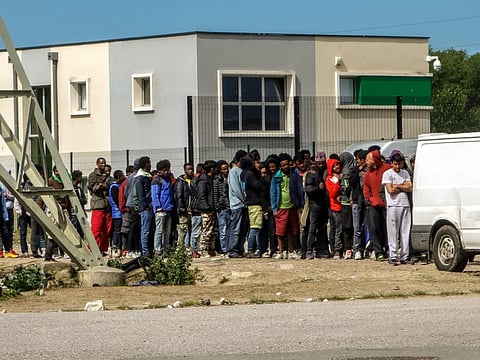Migrants deserve better treatment
Politicians ought to have the courage and good will to make a difference

Issues related to migrants are too complex. On one side, European “good conscience” advances generosity and humanity; on the other, one can’t be duped by the effects of criminality and blackmail. So many examples illustrate the frustration: Palestinian refugees escaping from Jaffa in 1948; criminal bands of smugglers operating with impunity out of Libya; the €6 billion (Dh25.91 billion) blackmail perpetrated by Turkey in 2016. The list is long.
The first difficulty in assessing the issue is that migrants are considered ‘as a whole’, whereas they are of different types and consequently can be handled accordingly. Similar solutions cannot be offered to ‘political’, ‘war’ or ‘economic’ refugees. The point is all the more important when it appears that 90 per cent of migrants are ‘economic migrants’ — which led Bill Gates eloquently put it as: “The more you are generous, the more you motivate other individuals to leave Africa.” This acts with a double effect: Impoverishment of a whole continent and inadequate welcoming conditions in Europe.
Within the humanitarian framework that Europe has abided by for years, the treatment of ‘political’ refugees requires swift management and political courage — sending back home effectively those who cannot prove their status. Out of the 90,000 migrants who had arrived in France in 2016, 25,000 had actually left the territory, while only half were under constraint.
The case of ‘war’ refugees also calls for a very specific approach. They are the victims of a situation, and it is rather obvious that such populations have no intention to lose their roots and live abroad in countries that do not share their culture or their religion. Why should Iraqi or Syrian refugees consider spending the rest of their lives in inhospitable suburban cities of Germany or France, to end-up in the ‘Calais Jungle’?
The problem is that we are not sure of the formulation of ‘welcoming’ by a continent that cannot accept any longer what it considers an ‘invasion’. This is a statement also on the refugees, who are being deprived of their own destiny. All efforts should thus be exerted to stabilise these populations in safe havens not too far from their land of origin, while waiting for a better future once the wars are over.
As for the ‘economic’ migrants issue, the most teasing one in terms of numbers, ‘generosity’ cannot be, here again, the sole answer. The only widely known solution for Europe is to help African countries to retain their population.
Meanwhile, 60,000 illegal migrants, mostly ‘economic’ ones, have entered Italy during the first six months of this year under the Dublin Treaty (making it mandatory for countries where the migrants reach first, to welcome them). A manageable issue for occasional migrants, it has become an inextricable controversy for the Italian government headed by Prime Minister Paolo Gentiloni due to two related facts: First, most of the migrants directly come from Libya, a rogue state where any local authority has disappeared further to an ill-conceived intervention by former French president and British prime minister, Nicolas Sarkozy and David Cameron, respectivelt. The ‘official’ government is furthermore split into two separate entities headed respectively by Fayez Al Saraj (Tripoli) and General Khalifa Haftar (Tobruk), which gives space to local criminal organisations for expanding in the rewarding business of smuggling migrants to Europe.
Another concern is the way numerous NGOs salvage refugee boats. They theoretically should disembark the saved passengers to ports of countries where they are registered. Practically, they disembark them all in Italy. Sometimes they have no obligation towards the rescued migrants and some of the NGOs have even been accused of organising departures from Libya through a direct cooperation with local smugglers.
Considering that Libya has been in a state of civil war since former leader Muammar Gaddafi was killed, French President Emmanuel Macron has signed an agreement recently with the two Libyan leaders, Al Saraj and Haftar, in order to set up local ‘hot-spots’, which would carry-out a first screening of refugees. But it is not sure whether Macron is well aware of the reality of the control that these two Libyan leaders have over their respective troops. One only hopes Macron will not repeat the mistake of sending French forces there.
The Italian government and Al Sarraj have jointly announced that a section of Italian Navy — comprising 60 vessels and 1,000 soldiers — will patrol Libya’s territorial waters soon and send back home whoever is rescued. A brilliant idea, it just remains to be seen how it will be implemented.
In the end, investing the funds in transition camps in Africa would make more sense. Not much is expected to change for migrants, though, until politicians gather the courage and will to make a difference to those people.
Luc Debieuvre is a French essayist and a lecturer at IRIS (Institut de Relations Internationales et Strategiques) and the ‘Faco’ Law University of Paris.


